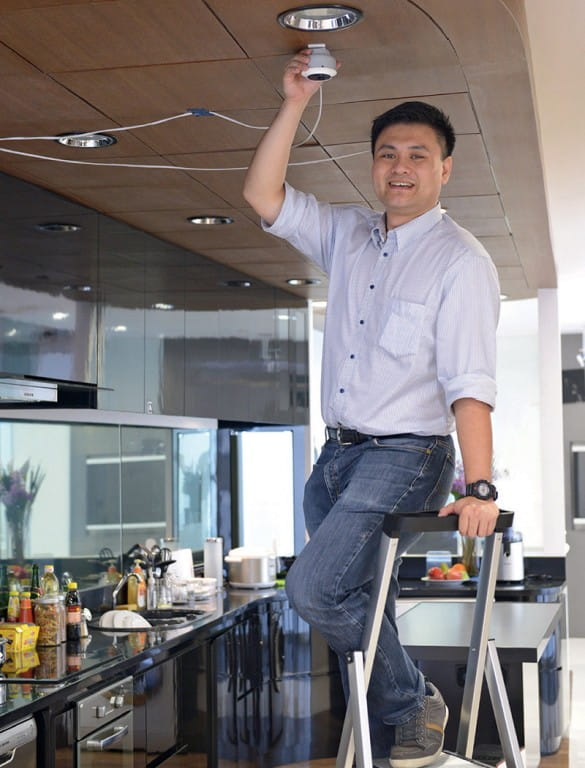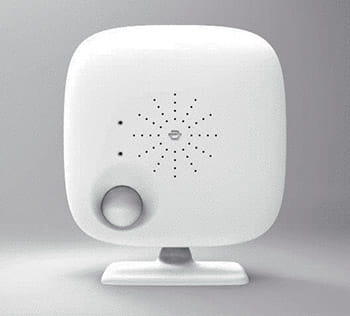Stories > Safe And Sound
Safe And Sound
To ensure better care for elderly people who live alone, local start-up SoundEye created an emergency monitoring device that detects cries for help.
BY DESMOND NG
PHOTOS SPH LIBRARY, SOUNDEYE
hen an elderly person who lives alone falls and is unable to move, it may take hours or even days before someone notices and help arrives. But local start-up SoundEye hopes to address this problem with its emergency and home monitoring system, the Ark, which can detect falls and cries for help.
The device has a microphone, an ultrasonic sensor that detects motion, and a camera. It can detect sounds and movement, provide a live video feed and enable communication between the elderly person and caregiver.

Dr Tan with an earlier prototype of his device.
The device responds to a scream or shout for help from the elderly person by sending an immediate alert to the caregiver’s mobile phone. An audio recording of the scream will also be sent to the caregiver’s phone at the same time, so the caregiver can listen to it and determine if it is a real emergency or a false alarm.
The caregiver can also communicate with the elderly person via an intercom; or initiate a live video feed to verify that the elderly person is injured. The Ark is slightly bigger than the size of one’s palm and can be installed on the ceiling, a wall or placed on the table. It also alerts the caregiver when no movement has been detected for a certain period of time.
SoundEye’s founder and chief executive officer, Dr Tan Yeow Kee, says he was inspired to create the Ark after working on a project involving the elderly in 2013 while he was employed by the Agency for Science, Technology and Research (A*Star).
He was particularly affected by what happened to an elderly lady living alone. “She told me that she once fell in the bathroom and had to wait a few days before being rescued by a relative. She survived by drinking water from the toilet bowl,” says Dr Tan.
IMPROVING LIVES
Realising the need for a better device – relative to what was already available – to monitor the safety of the elderly who live alone, he created a prototype of the Ark in 2013. This year, he resigned from A*Star – after 12 years with the agency – to concentrate on the project.
Dr Tan says SoundEye is not merely a tech start-up, but one that uses technology to improve the lives of everyone, especially the elderly.
He says a key difference between his device and the monitoring systems available in the market, which merely enable detection, is that the Ark also lets caregivers ascertain the situation without requiring further actions from the elderly person, who may be incapacitated.

The SoundEyeʼs Ark alerts caregivers when it detects falls as well as calls for help.
He explains: “Even if the elderly person has a handphone, he won’t be able to reach it if he falls on the floor and it is on the table, for example. With the Ark, even if the elderly person is unable to talk, you can still hear his moans or screams.”
Last December, the Ark participated in the inaugural Modern Aging Singapore initiative. It won S$25,000 in seed funding as well as mentorship support. The award by non-profit, healthcare think tank Access Health International and NUS Enterprise, the National University of Singapore’s start-up incubator, recognises innovative solutions that serve the needs of the elderly.
Dr Tan has tested the Ark in two pilot studies. The first was in 2014 with seven elderly people living alone in HDB flats (public housing) and the second last year was with the Ling Kwang Home For Senior Citizens.
He says: “The Ling Kwang Home found the ‘extra pair of eyes’ useful, especially at night. The HDB dwellers found it useful too but were concerned about the Ark’s cost.”
Currently, Dr Tan is fine-tuning the Ark. He plans to hold a crowdfunding exercise in the third quarter of this year to produce it. The Ark will be assembled in Singapore with parts sourced from China, and is expected to sell for less than US$90 each.
With ageing populations fast becoming a global phenomenon and more elderly people living alone as social structures change, Dr Tan sees huge potential for taking his device global and is looking for collaborators to do so. He is currently in discussions with companies in Japan, Malaysia, Australia, China and South Africa about possible partnerships.
The elderly are not the only ones who will benefit from using the Ark.
Dr Tan says: “With the Ark, caregivers don’t have to stay at home and watch their dependents 24-7. They can go out and work. If the Ark is used in welfare organisations and nursing homes, their staff members don’t have to constantly monitor their patients.”
